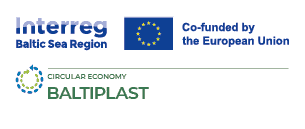
From Project to a Green and Resilient Baltic Sea Region
31 May 2024
The third General Assembly of the BALTIPLAST Project took place on the 22-23 May 2024 in Daugavpils, Latvia. Our project is currently in its second year of implementation and our practical solutions are actively being tested to address plastic pollution in the Baltic Sea Region. This two-day event brought together our project partners to discuss their progress, share ideas, and plan the next steps to achieve project objectives.
Our partnership is focused on creating solutions on different levels to limit single-use plastic and plastic pollution in the region. We are developing solutions in collaboration with the participating municipalities, focusing on strategies and management for limiting single-use plastic usage. Our efforts target communication and behaviour change among citizens, public and private administrations, and address both technical and technological aspects.
During the first day of the event, details about the importance of the Global Plastic Treaty in the process of limiting plastic pollution were presented by Coalition Clean Baltic, who is actively involved in following the negotiations and international policy developments. The Global Plastic Treaty stands as a significant milestone in the global fight against plastic pollution, holding importance for projects dedicated to reducing single-use plastics. By establishing an international framework for addressing plastic waste, this treaty provides a roadmap for joint action on a global scale. For projects acting on single-use plastic reduction, the treaty serves as a guiding light, offering clear guidelines and targets to work towards. It fosters collaboration among nations, encouraging the sharing of best practices, technologies, and resources to address plastic pollution. Its existence underscores the urgency of the plastic pollution crisis and highlights the collective responsibility of nations to take decisive action. By analysing the human health impact of plastic pollution, the Global Plastic Treaty plays an important role in raising awareness and mobilising support for the general public’s side. By being part of the BALTIPLAST project, participating municipalities can develop proactive actions to be ready for changes in the global legal framework.
Our partner municipalities presented their various levels of plastic reduction activities. The City of Helsinki achieved significant results in involving local households in the plastic reduction initiative. To enhance citizen participation in inventorying and reducing plastic use, Helsinki collaborated with influencers active on social media platforms who mobilised and kept the participants engaged in the six-week inventory process. The Swedish Consumer Association in collaboration with Västerås Municipality organised “The Plastic Championship” to connect with locals and facilitate the uptake of solutions created for households. The championship was announced on local media, social media and via direct contacts, the activity started with an in-person kick-off meeting in Västerås. Valmiera Municipality Government is taking steps towards more sustainable public events by implementing a deposit cup system at the Valmiera City Festival, and this way significantly reducing the waste resulting from single-use plastic. Daugavpils City Municipality in collaboration with Baltic Environmental Forum Latvia organised several workshops with local schools to educate the younger generation about responsible use of plastic. The City of Tallinn is leading the way in strategic solutions by incorporating actions to achieve a circular economy in the city’s development plan through influencing public procurement. Kaunas City Municipality advanced in technical and technological measures in cooperation with Kaunas University of Technology by testing the applicability of the Trinamix tool in improved sorting of plastic waste. In Hamburg, the “Climate Week” was organised in the district of Bergedorf by the Hamburg University of Applied Sciences, Baltic Environmental Forum Germany, Plastic-Free City, KuBus e.V. and an associate partner the Free and Hanseatic City of Hamburg, District of Bergedorf. This event served as a dissemination, awareness raising and networking opportunity with the local stakeholders.
During the second day of the General Assembly, the focus was on the environmental impact assessment of the implemented measures. Tallinn Technical University, presented three case studies, taking the lead in calculating the carbon footprint savings resulting from the implemented measures. Calculations are based on the data collected from the plastic inventory process and follow specific methodology for schools, businesses, municipal administrations, households and technical measures.
The discussions facilitated transnational collaboration between the partners, innovation and co-creation and set a solid foundation for the transfer, uptake and upscale of the solutions in the final year of the project. This collaborative approach allows the development of strong and effective solutions addressing specifically the needs of the region.





